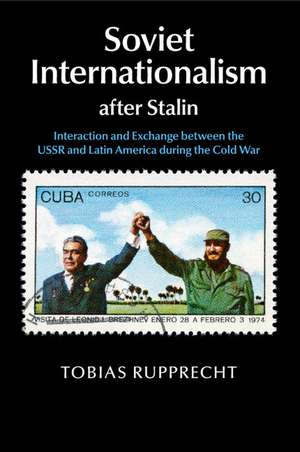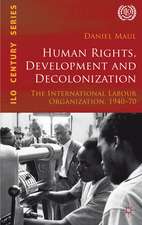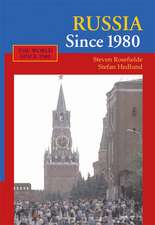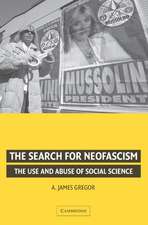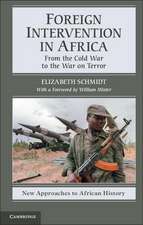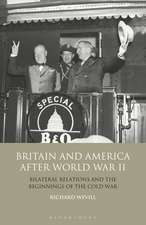Soviet Internationalism after Stalin: Interaction and Exchange between the USSR and Latin America during the Cold War
Autor Tobias Rupprechten Limba Engleză Paperback – 12 iul 2017
| Toate formatele și edițiile | Preț | Express |
|---|---|---|
| Paperback (1) | 288.25 lei 6-8 săpt. | |
| Cambridge University Press – 12 iul 2017 | 288.25 lei 6-8 săpt. | |
| Hardback (1) | 695.06 lei 6-8 săpt. | |
| Cambridge University Press – 5 aug 2015 | 695.06 lei 6-8 săpt. |
Preț: 288.25 lei
Nou
Puncte Express: 432
Preț estimativ în valută:
55.16€ • 57.26$ • 45.100£
55.16€ • 57.26$ • 45.100£
Carte tipărită la comandă
Livrare economică 22 martie-05 aprilie
Preluare comenzi: 021 569.72.76
Specificații
ISBN-13: 9781107501157
ISBN-10: 1107501156
Pagini: 344
Dimensiuni: 152 x 230 x 18 mm
Greutate: 0.46 kg
Ediția:Nouă
Editura: Cambridge University Press
Colecția Cambridge University Press
Locul publicării:New York, United States
ISBN-10: 1107501156
Pagini: 344
Dimensiuni: 152 x 230 x 18 mm
Greutate: 0.46 kg
Ediția:Nouă
Editura: Cambridge University Press
Colecția Cambridge University Press
Locul publicării:New York, United States
Cuprins
Introduction: the end of Soviet isolationism after 1953; 1. A modern image for the USSR: Soviet self-representation towards Latin Americans; 2. Moscow learns the mambo: Latin America and internationalism in Soviet popular culture; 3. Paradise lost and found: Latin American intellectuals in and on the Soviet Union; 4. From Russia with a diploma: Latin American students in the Soviet Union; 5. Desk revolutionaries: Soviet Latin Americanists and internationalism in the late Soviet Union; Conclusion: Soviet internationalism after Stalin and its domestic and foreign audiences.
Recenzii
'Tobias Rupprecht has high aspirations in his pathbreaking study of Soviet-Latin American encounters: to put Russia in global history, to put Latin America in Soviet history, and to put culture into the study of international relations. Using sources from Brasilia to Bogata to Moscow, he succeeds admirably in Soviet Internationalism after Stalin.' David C. Engerman, Brandeis University, Massachusetts
'Tobias Rupprecht has written a compelling account of Soviet cultural relations with Latin America during the Cold War. It ranges across a wide variety of cultural sources, from official propaganda to travelogues and films. … this is an interesting and useful study of a topic that has received too little attention in the recent past, and Rupprecht should be commended for having approached it with precision and flair.' Alessandro Iandolo, Journal of Contemporary History
'Overall, this outstanding book deserves a wide audience among Soviet historians and cultural historians of the Cold War. It rests on deep and wide-ranging primary source research (Russian archives, Russian and Spanish-language publications, and a handful of interviews), as well as a thorough command of recent scholarship in English, German, Russian, and Spanish, yet it is well written and engaging.' Julie Hessler, Slavic Review
'… an in-depth study on Soviet instruments, hopes, expertise, understanding and results of cultural and academic policy with regard to Latin America … predestined to serve as a highly valuable work of reference on Soviet-Latin American cultural relations, the more so as Soviet-Latin American relations in general remain on the current research agenda.' Ragna Boden, Jahrbücher für Geschichte Osteuropas
'Tobias Rupprecht has written a compelling account of Soviet cultural relations with Latin America during the Cold War. It ranges across a wide variety of cultural sources, from official propaganda to travelogues and films. … this is an interesting and useful study of a topic that has received too little attention in the recent past, and Rupprecht should be commended for having approached it with precision and flair.' Alessandro Iandolo, Journal of Contemporary History
'Overall, this outstanding book deserves a wide audience among Soviet historians and cultural historians of the Cold War. It rests on deep and wide-ranging primary source research (Russian archives, Russian and Spanish-language publications, and a handful of interviews), as well as a thorough command of recent scholarship in English, German, Russian, and Spanish, yet it is well written and engaging.' Julie Hessler, Slavic Review
'… an in-depth study on Soviet instruments, hopes, expertise, understanding and results of cultural and academic policy with regard to Latin America … predestined to serve as a highly valuable work of reference on Soviet-Latin American cultural relations, the more so as Soviet-Latin American relations in general remain on the current research agenda.' Ragna Boden, Jahrbücher für Geschichte Osteuropas
Notă biografică
Descriere
The first multi-archive-based study of Soviet relations with Latin America from the 1950s through the 1980s.
